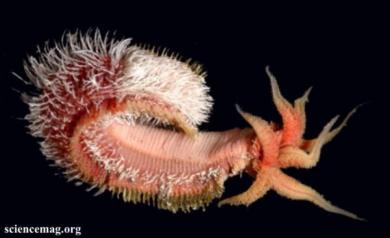 SKC Films Library SKC Films Library |
| SKC Films Library >> Science >> Zoology >> Phylum Annelida |
| Pompeii Worm Alvinella pompejana, a worm that lives in a very, very hot place The Pompeii worm is up to 5 inches long, pale gray with red tentacle-like gills on its head, and a back covered with "hairs." Although this species may occur elsewhere, the only population that has been studied inhabits geothermal vents on the East Pacific Ridge, at a depth of about a mile, about 1,200 miles west of Mexico. The hydrothermal vents upon which Pompeii worms live release jets of "super-heated" (up to 300º C / 570º F) water rich in sulfur and metals compounds. The worm lives inside a papery tube that it has burrowed into the side of the vent. Hot water from inside the vent flows through the tube and out into much colder water, resulting in a dramatic drop in water temperature from over 80º C (176º F) in the tube's inner regions to about 14º C (57º F) at the tube's outer entrance. The worm's head is at the cooler end, its tail at the hot end. When the worm leaves its tube to forage for food, it does so in water as cool as 10º C (50º F). The Pompeii's worm ability to ability to withstand heat may be due to the "hairs" on its back, which actually consists of bacterial colonies that feed on sugars excreted by the worm. It is believed that the bacteria contain special proteins that can withstand extreme temperature ranges. The worms secrete mucous from tiny glands on their backs to feed the bacteria, and in return they are protected by some degree of insulation. Initially discovered by French researchers in the early 1980's, Pompeii Worms remained out of reach of research scientists until 1997, when the submersible Alvin dove about a mile down to geothermal vents The genus name Alvinella honors the submersible which allowed scientists to study these unique animals, while the common name "Pompeii" refers to the famous volcano of the same name. Scientific Classification phylum Annelida SOURCES SEE ALSO |
| SKC Films Library
>> Science >> Zoology >> Phylum Annelida This page was last updated on 05/23/2017. |
